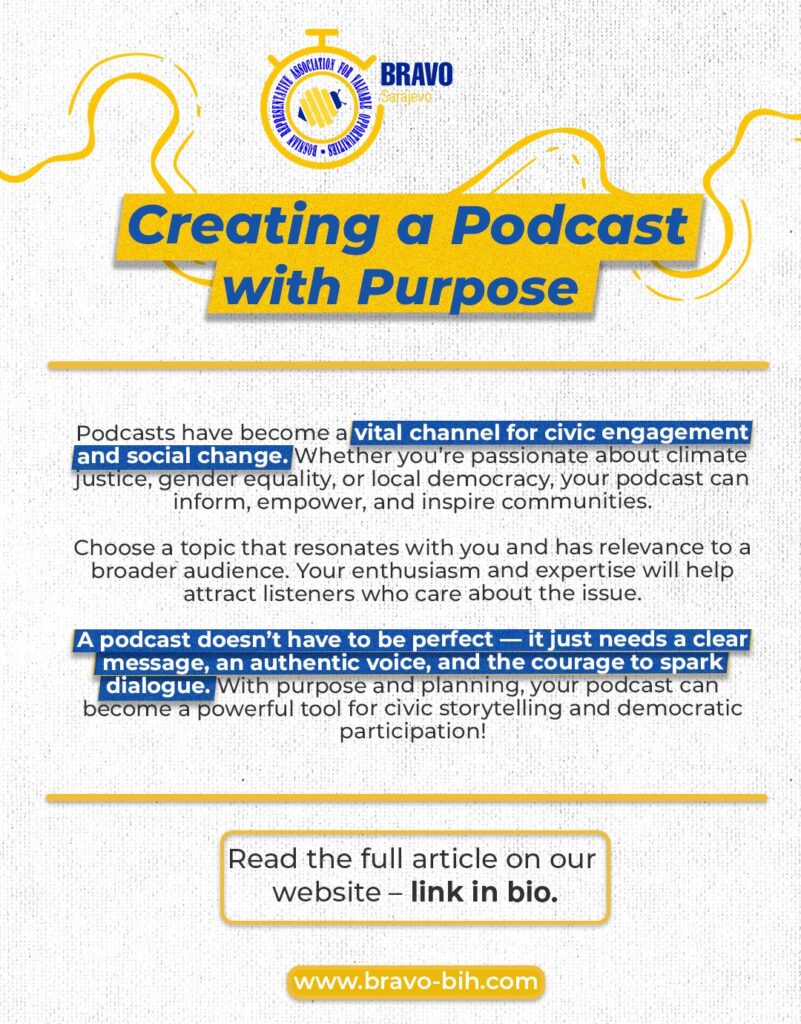
Podcasts have become a vital channel for civic engagement and social change. Whether you’re passionate about climate justice, gender equality, or local democracy, your podcast can inform, empower, and inspire communities. Here’s a practical, beginner-friendly guide to structuring a podcast that makes a difference!
Choosing a Theme That Matters
- Identify the Core Issue: Start by clearly defining the social or civic problem your podcast will address. Use tools like the “problem tree analysis” to understand the root causes and scope — local, national, or global — of the topics you want to explore.
- Propose Solutions: Go beyond highlighting problems; offer insights, solutions, or new perspectives! This helps your podcast stand out as a catalyst for positive change.
- Align with Your Passion and Audience: Choose a topic that resonates with you and has relevance to a broader audience. Your enthusiasm and expertise will help attract listeners who care about the issue.
Structuring Your Podcast
- Select a Format: Consider which format best suits your topic and strengths:
- Interview: Bring in experts or community voices.
- Narrative/Storytelling: Tell compelling stories with a clear beginning, middle, and end.
- Panel Discussion: Feature multiple guests with diverse perspectives.
- Solo or Co-hosted: Share your own insights or have conversations with a partner.
- Plan Episodes: Outline each episode with a clear structure:
- Introduction: Briefly introduce the topic and what listeners can expect.
- Main Content: Dive into stories, interviews, or discussions.
- Conclusion: Summarise key takeaways and suggest actions or further reflection.
Balancing Facts and Opinions
- Fact-Check Everything: Use credible sources and research thoroughly before sharing information. Transparency builds trust and credibility.
- Present Diverse Viewpoints: Especially on controversial topics, strive for fairness and balance. Acknowledge different perspectives and avoid bias.
- Correct Mistakes Promptly: If you make an error, address it openly in your podcast and provide the correct information.
Ethical Interviewing and Sourcing
- Transparency: Disclose any relationships with guests or sponsors. Be upfront about your intentions and how the content will be used.
- Respect Privacy: Obtain consent before recording and sharing personal stories, especially when dealing with sensitive issues.
- Fair Representation: Let guests speak for themselves and avoid misrepresenting their views.
Using Storytelling to Inspire Action
- Combine Facts with Emotion: Pair data and research with personal experiences to create a compelling narrative.
- Highlight Real Voices: Use interviews and stories from people directly affected by the issue to foster empathy and connection.
- Offer Clear Calls to Action: Encourage listeners to get involved, whether by volunteering, voting, or simply learning more.
Tips for Being Inclusive and Accessible
- Use Clear, Simple Language: Avoid jargon and explain complex concepts so everyone can follow along.
- Provide Context: Assume listeners may not be familiar with all aspects of the topics, so offer background information and definitions as needed.
- Make Your Podcast Accessible: Consider providing transcripts, using accessible platforms, and ensuring your content is welcoming to all.
Getting Started: Practical Advice
- Start Small and Learn: You don’t need expensive equipment — free or low-cost tools like Audacity or Hindenburg are great for beginners! Launch and learn as you go.
- Be Consistent: Regular episode releases and a consistent structure help build a loyal audience.
- Engage Your Community: Encourage feedback, invite listener stories, and foster a sense of belonging around your podcast’s mission.
A podcast doesn’t have to be perfect — it just needs a clear message, an authentic voice, and the courage to spark dialogue. With purpose and planning, your podcast can become a powerful tool for civic storytelling and democratic participation!
